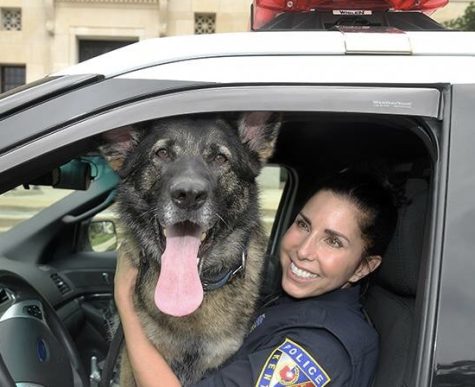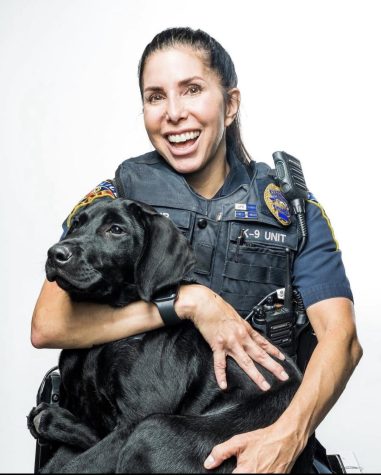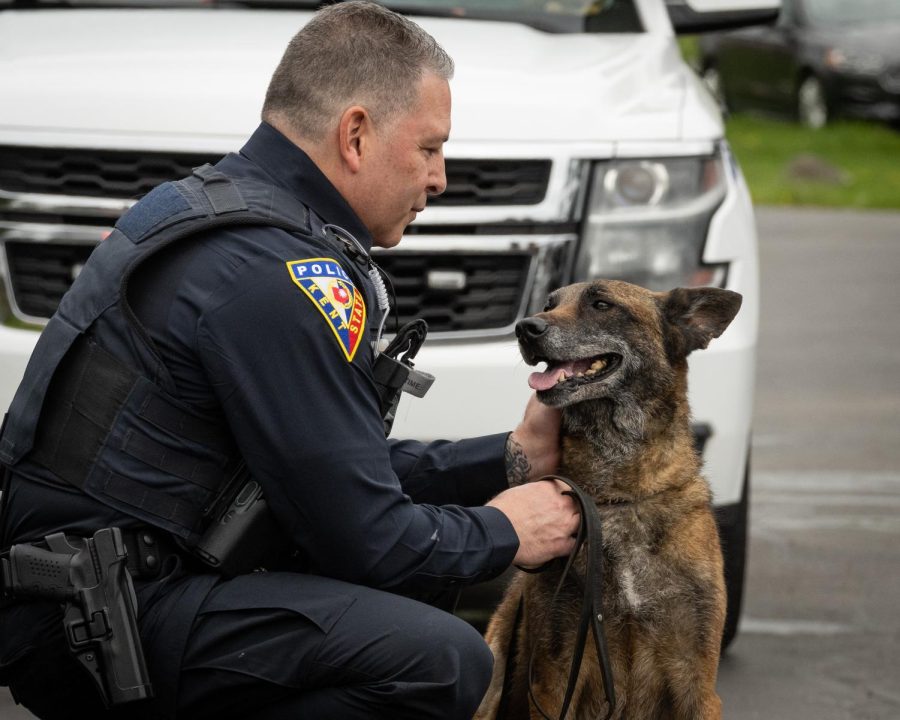K9 handlers and their dogs share indescribable bond
Officer Miguel Witt with Dexter, a K9 who worked for the Kent State Police until his death in April.
K9 handlers and their K9s go through up to six months of training that creates an unbreakable bond, said officers from the Kent State Police Services.
Coco, Salem and Freddie are all K9s who are integral parts of the team, officers said. Dexter, the second-ever explosive detection K9 who just recently died, added an amazing work ethic to the department as well, said Officer Miguel Witt, his handler.
“Some handlers are like well, it’s just another tool that we use as a police officer,” Witt said. “Sgt. Spahr and I aren’t of that philosophy. The dogs come home with us. They are a part of our family.”
Anne Spahr is the other K9 handler at Kent State, handling both Coco and one of the new K9s, Salem.

Spahr introduced the K9-unit that started in 2013 after the Boston Marathon bombings and due to Kent State’s large population and types of events, such as concerts, sporting events and parades. These are large scale events that bring in large numbers of people, which makes safety a number one priority. The dogs are explosive detection dogs, meaning they search for bombs and firearms at these events.
Both handlers and K9s go through intensive training together, Spahr said. They train at a K9 academy for six weeks, day and night, to make a “solid team together.” Afterward, they come back and continue maintenance training every two weeks. The initial training can last six months or more depending how quickly the dogs learn, she said.
The relationship between a handler and their K9 is a bond that can really not be described, Spahr said.
“That is your partner. You are going into situations with that dog, very critical situations sometimes. You are literally putting your life in their hands sometimes,” she said. “It’s a partnership. You’re a team. You know how you feel about pets, you love them, and it’s this unconditional love. It’s even beyond that with your K9.”
Not only do the K9s create a bond with their handler, but they also form relationships with the other officers and sergeants in the building. During his time at Kent State, Dexter would often pop his head into different offices and greet officers, Sgt. Tricia Knoles said.
“I would always keep dog treats in my drawer, so he knows that he’s getting a treat if he comes in here,” she said. “Dexter was not a typical Malinois. Most Malinois are extremely hyper, but he was just a very chill demeanor, which is kind of opposite of a Malinois.”
Dexter joined the police services at only 18 months old. After more than eight years of service, he worked until the last days of his life. Only three days before his death, he and Witt swept a university venue.
Dexter died, and then was laid to rest April 29. Officers and their K9s share a bond, and that was no different for Witt and Dexter.
Although the police services said goodbye to Dexter, his memory lives on. The bond Witt had with Dexter is what he remembers most, he said. Dexter became his pet and a part of his family.
Now, there are two new K9s, Salem and Freddie, to share in the experience with their handlers Spahr and Witt.
Coco, a German shepherd and the first K9 to serve for the Kent State police services, was imprinted in Germany. She learned some of the basic training before eventually coming to America to join the police services in 2013.

Freddie, a Czech shepherd, and Salem, a Labrador retriever, are the newest members of the K9 unit.
“More often, I’m going to try with Freddie now because we’re still figuring out each other a little bit, so we got the basics,” Witt said. “Now we’re just finetuning all the real details on us figuring out how to work together.”
Josie Burkhart is a reporter. Contact her at [email protected].



